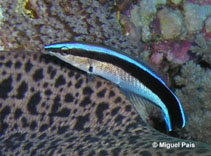| Family: |
Labridae (Wrasses) |
| Max. size: |
14 cm TL (male/unsexed); max. reported age: 4 years |
| Environment: |
reef-associated; marine; depth range 0 - 100 m, non-migratory |
| Distribution: |
Indo-Pacific: Persian Gulf (Ref.80050); Red Sea and East Africa (Ref. 4392) to the Line, Marquesas, and Ducie islands, north to southern Japan, south to Lord Howe and Rapa islands. |
| Diagnosis: |
Dorsal spines (total): 9-9; Dorsal soft rays (total): 10-11; Anal spines: 3-3; Anal soft rays: 10-10. Often with yellow back in deep water (Ref. 48636). Scales on lateral line: 50-52 (+2 past hypural) (Ref. 1602). |
| Biology: |
Inhabits coral rich areas of inner lagoons and subtidal reef flats to seaward reefs (Ref. 1602). Feeds on crustacean ectoparasites and mucus of other fishes (Ref. 9823, 48636). Monogamous (Ref. 52884). A protogynous hermaphrodite (Ref. 55367). Stays in stations where other fish come to be cleaned. Cleaning intensity is not related to client size or commonness (Ref. 28019). Cleaning stations are occupied by a pair of adults, a group of juveniles or a group of females accompanied by a dominant male where a female becomes a functional male if the dominant male disappears (Ref. 5503). Some adults solitary and territorial. An unfamiliar visitor is usually greeted by dance-like movements with the tail maneuvering the back part of the body up and down. Juveniles behave this way when divers approach closely (Ref. 48636). Minimum depth range of 1 meter in Ref. 27115. |
| IUCN Red List Status: |
Least Concern (LC); Date assessed: 12 May 2008 Ref. (130435)
|
| Threat to humans: |
harmless |
Source and more info: www.fishbase.org. For personal, classroom, and other internal use only. Not for publication.
